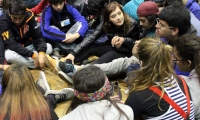EDITORIAL
We would spend hours, as children, with eyes that searched the dark sky to catch and surprise falling stars. They said to us, "When you see a falling star, make a wish." But it is always sad to see a star that detaches itself from the sky and falls. Where do falling stars go?
One of the most beautiful experiences we live as educators is when a young person approaches us during the day and asks us for a minute because he must confide something important to us: “Father, I'm in love, I'm the happiest person in the world. I really wanted to tell you because you are an important person for me.” His face has a strange luminosity, the words overlap, there is agitation and then silence. They await our reply. Sometimes they just wait until we tell them that we are happy and that we share their joy, a word of encouragement. The magic of the moment is felt. And heard.
What a teenager needs most is being “listened to, heard”.
In general, we hear that young people are: passionate, fearless, idealistic, reckless. Young people are indeed like this, sometimes it could be an advantage or a danger. But, on a cold December 1859, in the silence of the outskirts of Turin, in a modest room, 19 young people listened attentively to the words of a dreamer priest and made a covenant: they promised to give themselves entirely to God and to help young people throughout their lives. And to be like Don Bosco, that priest who above all loved them.
Many argue that the world is made up of numbers, but isn't it also made up of words? Language is the most effective communication tool for humans. One of our parents' deepest emotions was hearing us utter our very first word when we first learned to speak. There are words that cause more damage in our lives than a stab and others that are balms that heal deeper wounds. Our society and the whole reality that we are have been built on words.




